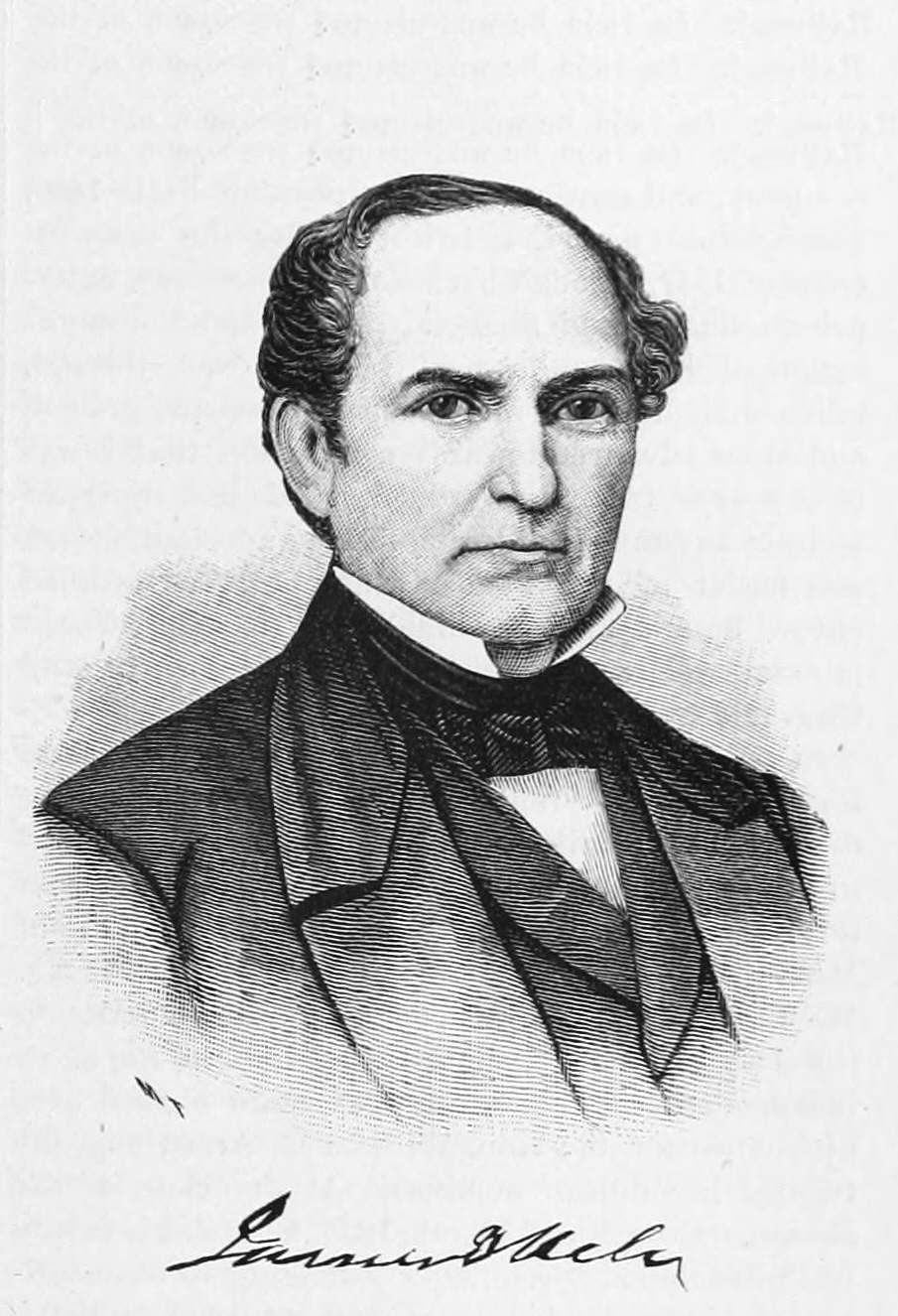Husband Hon. James T. Hale 1 2 3

Born: 14 Oct 1810 - Bradford Co, PA 1 4
Christened:
Died: 6 Apr 1865 - Bellefonte, Centre Co, PA 5
Buried:
Father: [Father] Hale ( - )
Mother:
Marriage: 6 May 1835 4
Wife Jane W. Huston 3 4
Born: 10 May 1815 3
Christened:
Died:
Buried:
Father: Hon. Charles Huston (1771-1849) 6 7 8 9
Mother: Mary Winters (1777- ) 8 9 10
Children
1 M Capt. Charles Huston Hale 5
Born:
Christened:
Died:
Buried:
2 M James T. Hale, Jr. 3 5
Born:
Christened:
Died:
Buried:
Spouse: Unknown ( - )
3 M George Natt Hale 5
Born:
Christened:
Died:
Buried:
4 F Lucy Hale 3 5
Born:
Christened:
Died: Aft 1898
Buried:
Spouse: Rev. George G. Field ( - ) 3 5
5 F Ellen Hale 3 5
Born:
Christened:
Died: Aft 1898
Buried:
Spouse: N. H. Stone ( - ) 3 5
General Notes: Husband - Hon. James T. Hale
He lived with his parents on a farm, working thereon, and at intervals attending the schools of the neighborhood, until he was about fifteen years of age, when his father died, and, he being the eldest son, the support of the family was chiefly thrown upon him. Some time after the death of his father, he became the clerk in the prothonotary's office at Towanda. He then entered upon the study of the law under the direction of his uncle, Elias W. Hale, of Lewistown, Pennsylvania, and on February 28, 1832, was admitted to the Bar at that place. In 1835 he removed to Bellefonte, Pennsylvania. He continued his practice in the courts of Mifflin County, and also attended the courts in the counties of Clearfield and Clinton. He was engaged in the trial of all the principal causes tried in the several courts for many years, until April 10, 1851, when a vacancy occurred in what afterward became the Twenty-fifth Judicial District, whereof he was appointed president judge by Gov. Johnston. He presided in the several courts of the district until December 1, 1851, when his commission expired, and he was succeeded by the Hon. Alexander Jordan. He occupied the Bench but a short time, but during that brief period discharged the arduous duties of president judge with such promptness, dispatch, ability, and impartiality, that he achieved such popularity and renown as a clear-headed and excellent judge as is rarely attained by men who occupy the Bench for longer terms. After retiring from the Bench he resumed his profession, in which he con-tinued until about 1856, when he had become so largely engaged in other enterprises that he was, to a great extent, obliged to abandon the active duties of the profession. Having become interested as part owner in a large body of timber and coal lands in the counties of Cambria, Centre and Clearfield, known as the Philips estate, whose value, development and availability depended chiefly upon railroad communication, he embarked his means, industry, energy and financial skill in the building of the Tyrone & Clearfield railroad. In 1856, he was elected president of the company, and continued in that position until 1860. During that period, notwithstanding the financial crisis of 1857, through his indomitable energy and enterprise, industry and financial ability, and the application of his own means, the road was, through much difficulty and many embarrassments, graded and so far advanced toward completion that it was in a year or two afterward finished and equipped and put in running order; and that important branch and feeder of the Pennsylvania Central railroad opened up and made available the rich timber and mineral wealth of parts of Cambria, Centre and Clearfield counties.
In politics Judge Hale was an ardent Whig and high-tariff man. When the Whig party passed out of existence he united with the Republican party, and in 1858 was elected to the XXXVIth Congress from the Eighteenth District, composed of the counties of Mifflin, Centre, Clinton, Lycoming, Potter and Tioga. He was re-elected in 1860, from the same district, to the XXXVIIth Congress. In 1862 he ran as an independent candidate, and was again elected over his competitor, the Hon. Wm. H. Armstrong, the regular Republican nominee. At the close of the session on March 4, 1865, he took his family to Philadelphia, where, after attending to some private business, he left them, and returned to Bellefonte, and at once engaged in professional work, tried several cases at a special court held by his honor, Judge Pearson, and, though not being well, he argued a cause with great force and ability on March 31. The day following he was quite sick, and continued growing worse until the following Thursday evening, April 6, 1865, when he died.
From his first entry into Centre County, he was a consistent friend of the temperance cause, and the first to advocate publicly the passage of laws to prohibit the manufacture and sale of liquor as a beverage. He possessed a bright intellect, a remarkably tenacious memory (never forgot a legal principle or a reported case he had read), and an intuitive knowledge of the law, was quick in his perceptive power, always ready, and as it has been said of him, "was a lawyer without a book or an office." In the trial of causes he was cool and calm, amiable and scarcely ever ruffled in temper, or disconcerted by any turn the case might take, and by his commanding presence, pleasing address, persuasive manner, simple but forcible diction, and, withal, sound argument, he was sure to carry the court and jury with him. He was a member and vestryman and prominent in the councils of the Episcopal Church.